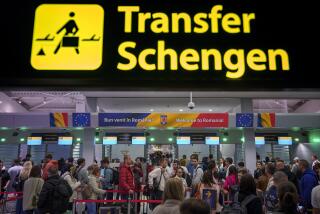Sarajevo Airport Opening for Business
- Share via
ZAGREB, Croatia — Don’t expect a duty-free shop or a cocktail lounge quite yet, but Sarajevo’s war-ravaged international airport reopens to civilian commercial air traffic today, a milestone in the peacetime recovery of Bosnia.
Croatia Airlines and a Turkish company will be the first carriers to venture into skies that just months ago rang with artillery fire. Mines that once bordered the runway have been cleared, while shattered walls and windows have been patched.
Opening the airport after more than four years was a herculean task involving at least as much political and military wrangling as aeronautical logistics, say U.S. officials overseeing the project.
Secretary of State Warren Christopher will fly in for today’s inauguration; the first regularly scheduled passenger flights begin Monday. Bosnia-Herzegovina has also signed air agreements with Iran and Germany, Ismet Secic, the head of its new civil aviation authority, told reporters Wednesday.
The airport was closed shortly after the war began in April 1992, as neighborhoods surrounding it bore some of the fiercest fighting of the conflict. The Bosnian Serb army that was attacking Sarajevo eventually agreed to let the United Nations take control of the airport for U.N. military and humanitarian flights. Still, Bosnian Serb gunners took potshots at planes, forcing flights to be suspended.
Today, NATO-led troops enforcing the peace accord that stopped the war in December control the airport and all airspace over Bosnia and will continue to do so. French peacekeepers, for example, will continue to handle air-traffic control.
That’s a good thing, since all of Bosnia’s air controllers left the country during the war, many joining the Serbian side. A U.S.-financed program is scheduled to begin training a new batch.
As for the Bosnians, they will be responsible for immigration, customs and security screening of passengers and baggage.
One of Bosnia’s other major airports is at Banja Luka, the largest city in Serbian hands. It was barely damaged in the war and also could have reopened, Western officials said, but the separatist-minded Bosnian Serbs refused to recognize a single civil aviation authority for the whole country.
Similar disputes have held up the reconnecting of national train service, electrical grids and water--projects that involve piecing together Bosnia’s ethnic fragments.
Meanwhile, Croatia Airlines officials here in Zagreb, the capital from where Monday’s first flight will depart, said they are confident that travel to Sarajevo will be safe. The air routes, they pointed out, do not fly over Serb-held territory.
But officials said they must use visual landings until sophisticated, precision instruments are brought in as part of a second, $28-million phase of airport reconstruction. Because Sarajevo is notorious for fog and bad weather, “You can expect a lot of cancellations and disruptions,” Croatia Airlines executive Roman Gebaur said.
Still, the opening of Sarajevo International Airport will provide an important psychological, cultural and economic boost to the isolated capital, which endured a crippling 43-month siege, said Richard Sklar, President Clinton’s special representative for reconstruction in Bosnia. Sklar coordinated much of the refurbishing, which will take three years to complete, at which time the airport will be in the condition it was in before the war, when it handled 700,000 travelers a year. He cautioned that the airport, for now, is still “primitive.”
The only new equipment purchased so far has been three X-ray screening machines, he said. Passengers will not yet be able to walk up to the airport; they will be bused from downtown in groups to make processing easier. And the terminal remains heavily damaged. But a few basic amenities have been added, Sklar said, noting: “I told them: No bathrooms, no airport.”
A long list of stringent conditions had to be met before North Atlantic Treaty Organization commanders would let commercial air traffic begin. NATO will continue to have the right to close the airport at any time for security reasons. The Bosnian government and the airlines had to agree to rules that included no overnight stays by aircraft, limits on luggage and strict management of passengers.
More to Read
Sign up for Essential California
The most important California stories and recommendations in your inbox every morning.
You may occasionally receive promotional content from the Los Angeles Times.











